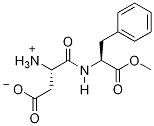Aspartame
Aspartame (better known by its tradename NutraSweet®) is an artificial sweetener consisting of a derivative of a dipeptide of aspartic acid and phenylalanine. It was developed in 1965 but did not go on the market in the United States and much of Europe until the 1980s. In the world of color coding, it comes in the blue packages.

| Potentially edible! Food woo |
| Fabulous food! |
| Delectable diets! |
| Bodacious bods! |
|
v - t - e |
Controversy over safety
While aspartame is generally considered safe, the approval process was rather protracted due to concerns about possible cancer risk. Aspartame is known, due to its phenylalanine content, to be unsafe for sufferers of the genetic disease phenylketonuria, but this so far is the only proven risk (other studies on the matter have been widely disputed). However, many people, citing the complicated and sometimes overly chummy approval process (among other things, Searle's CEO was Donald Rumsfeld, the much-reviled Secretary of Defense under both Gerald Ford and Bush II), have blamed aspartame for any number of ills (including allegations that it causes brain tumors), and much has been made about the presence of trace amounts of methanol in the metabolites of the substance. However, two reports by the Government Accountability Office found no violations of procedure in the approval process.[1][2] To go over the FDA's ADA (acceptable daily intake), it would require an adult to consume 21 cans of diet soda per day, or about 7600 cans a year. Aspartame is considered safe by health authorities in over 90 nations, and is one of the most studied and vetted food additives in the world.
Possible harmful effects
Some studies that show possible harmful effects have been produced. One study found an increased risk of preterm delivery in pregnant women who drank moderately high amounts of artificially sweetened beverages. No increased risk was found in women who drank beverages containing sugar.[3] However, numerous problems with this paper have been reported, including a low association value and a lack of a plausible mechanism.[4] One study done in rats found kidney damage in the offspring of pregnant rats at a level of exposure of 14mg/kg on day 9, 10 and 11 of pregnancy.[5] However, this study has failed to be replicated.[6]
A study published in 2011 found an increased risk of cardiovascular disease in people who drink diet soda.[7] This study also looked at a link between regular soda and cardiovascular disease, but no such link could be found. The link of cardiovascular disease with diet soda persisted after adjustment for metabolic syndrome, peripheral vascular disease, and cardiac disease history. The study does not appear to distinguish between diet soda sweetened with aspartame and diet soda sweetened with sucralose, however.
By contrast, a 2013 study on European adults found a link between type 2 diabetes and sugar-sweetened soft drinks, but not between type 2 diabetes and artificially-sweetened soft drinks.[8]
One 2014 study suggests increases in irritability, depression and worse spatial orientation skills.[9] At the levels mentioned in this study, a 60kg human would need to ingest at least 1l of most commercially available diet sodas.[10]
Due to the fact that studies showing these harmful effects haven't been replicated, aspartame remains on the market, much to the relief of diabetics everywhere. However, that won't stop common cherry-picking of these studies.
Aspartame sensitivity
Some people claim to be sensitive to aspartame. An experiment by researchers in the United Kingdom showed that there were no measurable metabolic responses to consuming aspartame, and that subjective felt response was identical to control groups fed a different artificial sweetener[11]. Broadly speaking, this implies that aspartame sensitivity is complete nonsense.
Monsatan!
Aspartame was invented by G.D. Searle in 1965, but G.D. Searle themselves were bought out by Monsanto in 1985. Anti-Monsanto-anti-aspartame activists have been saying that "Monsanto invented aspartame!" ever since.[12]
In a nutshell
See also
External links
- Wikipedia's article
File:Wikipedia's W.svg on aspartame - Wikipedia's article
File:Wikipedia's W.svg on the aspartame controversy (sadly, not quite neutral on the subject) - Snopes.com aggregation of articles on the subject
- Aspartame fact sheet at Health Canada
- Artificial sweeteners and cancer fact sheet at the National Cancer Institute
- Markle aspartame hoax e-mail
- Aspartame - Truth vs. Fiction, Science-Based Medicine
- The Straight Dope: Did aspartame (NutraSweet) cause Gulf War Syndrome?
References
- FDA: Six Former HHS Employees' Involvement in the Aspartame Approval, 1986 GAO report
- FDA: Food Additive Approval Process Followed for Aspartame, 1987 GAO report
- http://www.ajcn.org/content/early/2010/06/30/ajcn.2009.28968.abstract
- http://www.ajcn.org/content/92/5/1277.2.full
- http://www.scielo.cl/pdf/ijmorphol/v25n4/art04.pdf
- Magnuson et al. Aspartame: a safety evaluation based on current use levels, regulations, and toxicological and epidemiological studies. Crit Rev Toxicol. 2007;37(8):629-727.
- Th P55 - Soda Consumption and Risk of Vascular Events in the Northern Manhattan Study
- Romaguera, Consumption of sweet beverages and type 2 diabetes incidence in European adults: results from EPIC-InterAct, Clinical and Experimental Diabetes and Metabolism, 26-April-2013
- http://onlinelibrary.wiley.com/doi/10.1002/nur.21595/abstract
- http://static.diabetesselfmanagement.com/pdfs/DSM0310_012.pdf
- Aspartame Sensitivity? A Double Blind Randomised Crossover Study PLOS ONE.
- The Spin on Aspartame, at the oh-so-scientifically-sound organicandhealthy.org, Nov. 2016